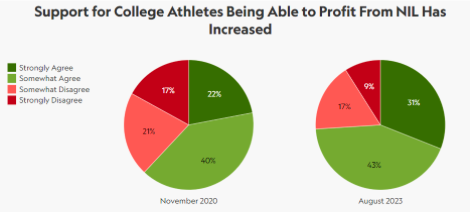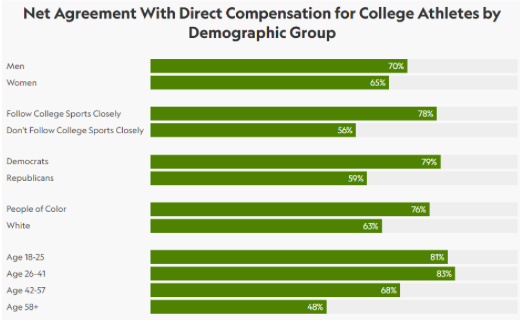Brief • 4 min Read
Americans Support Paying College Athletes, Old Age Enters a New Age, Back to School Stress and The Retiring Boomer Crunch.
The latest trends in society and culture from The Harris Poll
Will Federal Reserve chair Jerome Powell signal further interest rate hikes in this week’s Jackson Hole symposium? The FT reports that global stock markets have lost about $3tn in value this month. In our America This Week survey, fielded August 18th to 20th, among 1,989 Americans, seven in ten (71%) worry over living expenses and (54%) about losing their jobs. These are stressors that Millennials are especially shouldering (76%, 64%).
Here’s what you need to know this week: First, college football is back this weekend, and Americans believe it’s time athletes should be paid. Next, Americans are redefining aging where “old” doesn’t mean what it once did. Then, with the new school year starting, extra stress is placed on parents, especially those who have kids with learning and thinking differences. Finally, a Harris survey of employers shows that waves of retiring Boomers magnify the current labor shortage.
You can download the new ATW monthly summary tabs and ppt deck here.
It’s Time to Pay College Athletes: Sportico-Harris Poll
Two years after collegiate athletes were granted the opportunity to earn money from their name, image, and likeness, Americans are ready – if not eager – to do away with the remaining NCAA restrictions that uphold the notion of amateurism, according to our latest poll with Sportico.
- More Americans today (74%) support athletes’ right to earn from their NIL than in November 2020 (62%), when Sportico and The Harris Poll last surveyed the question, about eight months before the NCAA’s interim NIL policy took effect:

- While mainly advocating deregulating the NCAA’s college athlete earning restrictions, (80%) of Americans also agree that college sports need to have uniform NIL standards.
- But it’s also time to “show me the money”: Two-thirds (67%) of Americans believe college athletes should be able to receive direct compensation from their school, and slightly smaller majorities support athletes’ rights to obtain employee status (64%) and to bargain as a labor union collectively (59%).

Takeaway: Over a dozen pieces of NIL legislation have been proposed in Congress. Yet NCAA’s president Charlie Baker has publicly asserted that most college athletes do not want to become employees and that it is his prerogative to keep it that way. This position is increasingly out of step with the country amid major college conference realignment to secure massive TV revenue for member schools. According to one estimate, annual payouts to Big Ten schools in a new deal could reach over $60 million in television revenue alone. Total conference payouts could reach $90 million per year. There might be some money lying around to pay players.
Old Age Enters A New Age: Age Wave-Harris Poll
The old saying goes that age is all in your mind. A new poll with Age Wave confirms substantial shifts in Americans’ perceptions of aging and longevity.
- We have entered a new age of aging: (79%) of adults aged 50+ think today’s older adults are more active, open-minded, and curious (58%) than the previous generation.
- The definition of “old” has also changed: While age 60 was once considered “old” in their grandparents’ time, now 80 is the median age considered “old” today.
- The importance of youthfulness has been replaced by usefulness: (83%) of those 65+ say it’s more vital for them to feel valuable than youthful in their retirement years.
- Leaving many to evolve their sense of what retirement should look like, as (59%) of pre-retirees and retirees say they want to work in some form in retirement.
Takeaway: The survey gives a crucial snapshot of our refashioned sensibilities regarding retirement, health, and longevity and the importance of leaving a legacy. “Aging has finally come of age,” said Ken Dychtwald, Ph.D., psychologist/ gerontologist and founder and CEO of Age Wave. “Understanding our evolving perceptions of aging is more urgent than ever, as people over 65 make up an increasingly large portion of the U.S. population each year.”
Back To School Stress Weighs On Many Parents: Understood.org-Harris Poll
As children around the country return to school, new Harris research with Understood.org shows that not all parents feel at ease with their kids out of their hair and back in the classroom.
- Many American parents brace for stress this school year: Over half (53%) of parents with children under 18 say that back-to-school season is the most stressful time of the year.
- Nearly 9 in 10 (87%) report that back-to-school season causes stress or anxiety.
- And it’s exacerbated for parents of children with learning and thinking differences (e.g., neurodivergent, dyslexic, etc.), who are more likely to report feeling stressed (39% v. 28%), unprepared (19% v. 12%), scared (17% v. 9%), and lonely (10% v. 3%).
Takeaway: “The reality is that contrary to what we see in popular culture, back-to-school season is often a challenging time for most parents,” said Dr. Andrew Kahn, Understood.org’s associate director of behavior change and expertise. “Back-to-school season presents a series of stressors for every parent, and for parents of a child with learning and thinking differences, it can be extremely isolating.”
Businesses Crunched By Retiring Boomers: Express Employment Professionals
Just a few years away from the last Baby Boomers entering the expected retirement age, U.S. employers are facing a compounded crisis of labor shortage and losing older, experienced workers, according to a recent survey with Express Employment Professionals.
- 8 in 10 (81%) U.S. hiring managers say employees have retired from their companies in the past two years, with a third of these employees having retired between ages 60 to 64 (33%) or 65 to 69 (33%) – on par with the ages at which hiring managers believe employees should retire at (60-64: 26%, 65-69: 24%).
- Over 8 in 10 (84%) U.S. employees say it’s a significant loss when older employees retire without passing on their years of knowledge to younger employees – a “brain drain.”
- When knowledge transfer fails, workers can be left learning how to do a job independently, with nearly half of U.S. employees (47%) experiencing this.
- Companies are acting on the brain drain: The majority (66%) believe their employer is taking the proper steps to ensure they don’t experience a “brain drain.”
Takeaway: “Baby Boomers are an essential part of the economy, and succession planning for their exit now should be a top priority,” said Express Employment International CEO Bill Stoller. “This is the perfect opportunity for baby boomers to train younger employees before they enjoy a hard-earned retirement, knowing their companies are in good hands.”
Subscribe for more Insights
Subscribe to our newsletter for the latest trends in business, politics, culture, and more.
Download the Data
This survey was conducted online within the U.S. by The Harris Poll from August 18th to 20th among a nationally representative sample of 1,989 U.S. adults.
Download
Subscribe for more Insights
Subscribe to our newsletter for the latest trends in business, politics, culture, and more.
Download the Data
This survey was conducted online within the U.S. by The Harris Poll from August 18th to 20th among a nationally representative sample of 1,989 U.S. adults.
DownloadRelated Content








